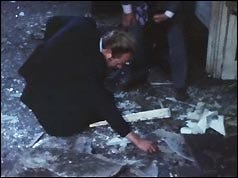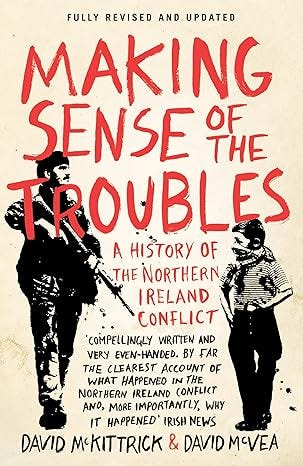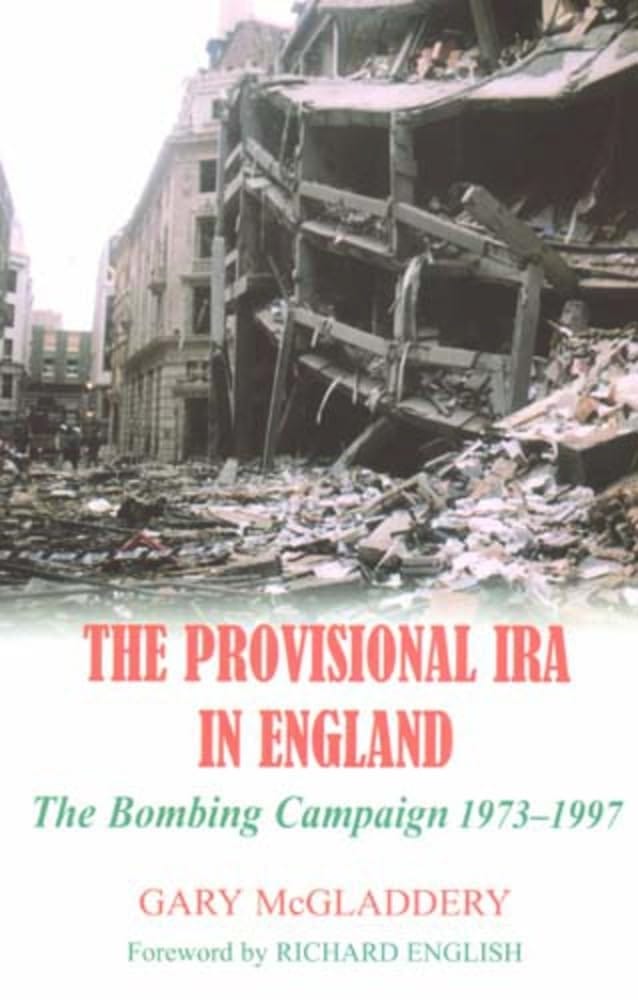In America in September 1973, Henry Kissinger was sworn in as America's 1st Jewish Secretary of State, succeeding William Rogers. This was a big move in the world of American politics. Meanwhile, across the pond in Northern Ireland, political moves were also being made that had religious connotations.
Political developments in September 1973
To find a political solution to the ongoing conflict, Irish Prime Minister Liam Cosgrave met with British Prime Minister Edward Heath on the 17th of September at Baldonnell, Co Dublin. After their meeting, they released a joint statement to the press.
The Taoiseach and the Prime Minister had a wide-ranging discussion on the situation in Northern Ireland and other issues affecting relations between the two countries.
They were in agreement on the need to bring the suffering of the people of Northern Ireland to an end as quickly as possible and to secure peace and reconciliation there. It was accepted that this objective can be achieved only through the democratic process, through the growth of trust and confidence between the two communities in the North and by closer cooperation between North and South. In this context, they reaffirmed their support for the concept of a Council of Ireland and their willingness to assist in its formation in a conference at which they would discuss with Northern Ireland representatives the form and functions of such a Council.
Means of containing and eliminating violence in Northern Ireland, irrespective of its source, were discussed.
The Taoiseach and the Prime Minister look forward to further meetings.
You can watch what Edward Heath and Liam Cosgrave had to say below.
The following day, Edward Heath gave a media interview where he said that if the Northern Ireland Assembly failed to establish a power-sharing Executive by March 1974, the best option would be to integrate Northern Ireland fully into the United Kingdom.
In July we saw the ongoing discussion surrounding the Civil Service and RUC reform, intending to alter the sectarian balance. On the 21st of September, J. Parke of the Senior Officers Association of the Northern Ireland Civil Service wrote a letter to Sir David Holden, the Permanent Secretary at the Ministry of Finance concerning calls for reforming senior levels of the Civil Service.
Here are the key takeouts from his letter.
We understand that what the would-be reformers envisage is the offer of premature retirement to senior officers in order to make room for the appointment of Roman Catholics.
My Association, which is non-sectarian and non-political, is utterly opposed to any proposition that appointments should be made on any basis other than merit.
Immediately we would foresee a decline in efficiency since experienced officials who had achieved their position in competition with their colleagues would be replaced by inexperienced newcomers or by people promoted on sectarian grounds. In the longer term, and even more seriously, we would fear the drift into a Civil Service where an officer's political and religious beliefs were determining factors in his career.
Rumours have circulated to the effect that a golden handshake arrangement may be contemplated to meet political demands. I trust you will enable us to assure our members that such rumours are totally without foundation and that there is no intention at any level within government of introducing a sectarian bias of any description into the appointment and promotion of civil servants.
The fascinating part of this letter, to me, is the last section, because on the 24th of September, Irish Foreign Minister Garret Fitzgerald, said that the British and Irish governments had agreed on the formation of an Executive for Northern Ireland, and on the reform of the RUC, the reform of the civil service, and the creation of a Council of Ireland.
Naturally, Mr Parke didn’t appreciate Mr Fitzgerald’s announcement, leading to him sending another letter to Sir David Holden.
Since I wrote to you on the 21st of September, further alarm has been generated by the speech made by the Republic's Minister for Foreign Affairs at the United Nations. His remarks implied that the issue of reorganisation of the Northern Ireland Civil Service had been transferred from the position of long-term deposit to the current account. Judging from newspaper and broadcast reports, Mr Fitzgerald is under the impression that an agreement to reorganise has already been reached between the Governments of the United Kingdom and the Republic. As you will appreciate, such a statement, unless contradicted by an authoritative spokesman for the British Government, can only add to the anxieties of our members.
Shootings in September 1973
02/09/73 - Three RUC officers were ambushed near Castlebar, County Mayo in the Republic of Ireland, across the border. Although shot, all three survived and were transferred back to Enniskillen under heavy police guard.
07/09/73 - The IRA shot dead off-duty UDR soldier Matthew Lilley (54), near Belcoo, County Fermanagh.
16/09/73 - Vice Chairman of the UDA, Tommy Herron (36), was found shot dead at Drumbo, near Lisburn. Various claims were later made about who was responsible for his killing. Some people suggested that because of his alleged involvement in racketeering, he may have been killed by elements within the UDA. Others suggested that a branch of British Army intelligence may have been involved. 50 years on, it’s still a mystery who killed Tommy Herron.
22/09/73 - Civilian James Brown (26), was found shot dead on Foyle Road, Derry. The IRA claimed he was an informer.
25/09/73 - Seamus Larkin (34), an ex-OIRA Volunteer, was shot dead by the OIRA near Killeen, Armagh. It’s reported that it was part of an internal feud.
Bombings in September 1973
05/09/73 - Catholic civilian Patrick Duffy (21), was killed when he triggered a booby-trap bomb by driving his tractor into a field at a farm at Greaghnagleragh, near Belcoo, County Fermanagh. It is believed it was planted by the IRA and intended for the security forces. The RUC had just removed a dummy bomb at the scene.
05/09/73 - The UFF claimed responsibility for a no-warning car bombing on Springfield Road, Belfast. The bomb was spotted and the area was evacuated. A bakery and 15 houses were damaged.
08/09/73 - An IRA bomb exploded at the ticket office in Victoria Station, London, injuring five people.
10/09/73 - There were two bomb attacks at train stations in London. The attacks were carried out by the IRA. At 1:00 pm, a small bomb exploded at King's Cross Railway Station, London. At 1:05 pm, the Press Association received a phone call warning of a bomb at Euston Railway Station. At 1:15 pm another small bomb, estimated at 2-5 pounds of explosives, exploded outside the Rail Bar at Euston Station, London. There were no deaths but 12 people were injured in the blast. This was the second wave of bombing attacks launched by the IRA in England in 1973 after the Old Bailey car bombing earlier in the year which had killed one and injured around 200 civilians.
11/09/73 - The UFF claimed responsibility for a no-warning bomb which badly damaged a Catholic church at Holywood Road in East Belfast.
11/09/73 - Two police officers were injured when an IRA bomb exploded at the offices of the Royal Naval Association in London. A woman collapsed and died during an evacuation following a hoax bomb alert at Euston Station, London.
17/09/73 - British Army bomb disposal expert Ronald Wilkinson (30), was wounded attempting to defuse an IRA bomb which had been planted in Birmingham, England. He died on the 23rd of September 1973. Another IRA bomb was discovered at a Household Cavalry camp in Surrey.
17/09/73 - The UFF claimed responsibility for bombing four Catholic schools in Belfast over a 24-hour period. Shortly afterwards, British soldiers were sent to guard all Catholic schools in Belfast. All the blasts were said by the British Army to be a new campaign against Catholic churches, schools and bars.
20/09/73 - Five people were injured when an IRA bomb exploded at the headquarters of the Duke of York in London.
23/09/73 - British soldier Ronald Wilkinson (30), was killed when trying to defuse a bomb which had been planted by the IRA in Birmingham.
28/09/73 - A car bomb exploded outside a grocery shop and house in Pettigo, County Donegal, in the Republic of Ireland. No warning was given and several people were injured. It is believed that loyalists associated with the UVF were to blame, and a Garda report suggested that British soldiers may have been involved. The bomb exploded just yards across the border. The British Army had been scheduled to patrol the border in the area that night but did not arrive.
As always, thanks very much for reading this and I hope you enjoyed it enough to come back on Tuesday to read the next issue (fingers crossed!). Don’t forget to click the share button below to send it to any of your family or friends who would enjoy reading it, or subscribe to make sure you don’t miss anything.
If you’d like to support the newsletter and need some cool t-shirts, hoodies or mugs, check out our Etsy Store.
Some recommended reading based on research for this instalment.
The Provisional IRA in England: The Bombing Campaign 1973-1997 by Gary McGladdery.








